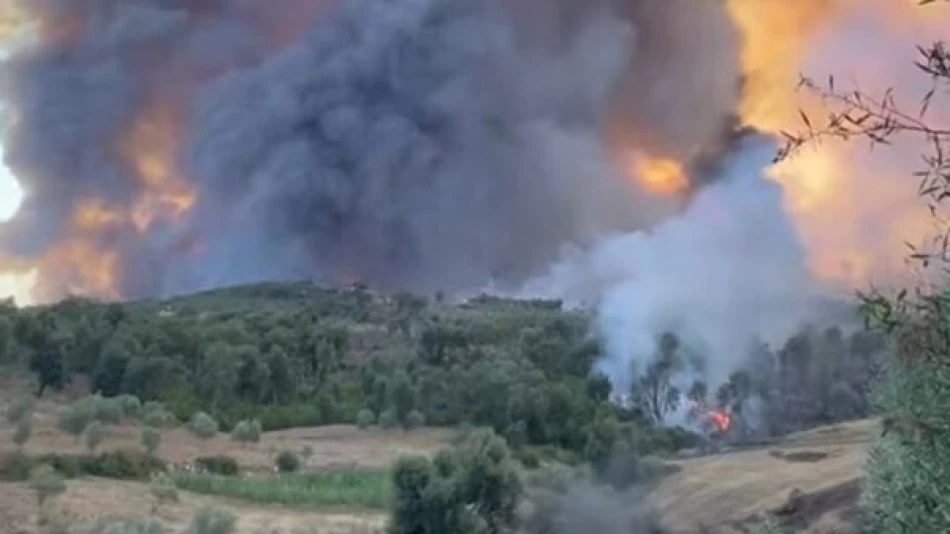
Massive Fire Breaks Out in Northern Morocco: Rescue Efforts Underway
Morocco's Tourist Haven Under Fire: Massive Wildfire Engulfs Forests Near Chefchaouen
A devastating wildfire continues to rage through forests surrounding Morocco's picturesque tourist destination of Chefchaouen, marking what locals describe as the worst blaze in 15 years. The fire, which erupted Tuesday evening, has prompted emergency aerial operations and threatens one of North Africa's most beloved mountain retreats as the country braces for an intense heatwave reaching up to 47°C.
Scale of the Disaster
Firefighting aircraft are currently conducting water-dropping operations over the affected areas in a desperate attempt to contain flames that have already consumed vast stretches of forest between the towns of Bab Berred and Derdara. The mountainous terrain, densely covered with forests, has complicated containment efforts while strong winds over the past two days have accelerated the fire's spread.
Local residents near the town of Derdara have described the situation as "catastrophic," with one witness telling reporters the material losses appear substantial. Social media footage shows community members joining firefighting efforts, using buckets of water against towering flames—a testament to both the fire's proximity to populated areas and the desperation of local communities.
Agricultural and Environmental Impact
The blaze has inflicted significant damage beyond forest areas, destroying agricultural fields near the town of Kerankha. This agricultural destruction threatens local livelihoods in a region where farming and tourism form economic pillars. The full extent of environmental damage remains unclear, but the affected mountainous forests serve as crucial ecosystems in Morocco's northern region.
Regional Fire Crisis Emerges
Chefchaouen's fire represents part of a broader regional emergency, with additional wildfires reported near Tetouan and Tangier—cities that form Morocco's northern tourist triangle. This clustering of fires suggests either coordinated arson, widespread negligence, or more likely, extreme weather conditions creating a tinderbox effect across the region.
The timing proves particularly concerning as Morocco's meteorological department forecasts a severe heatwave between Wednesday and Saturday, with temperatures expected to soar between 38°C and 47°C across multiple regions. Such conditions could transform contained fires into uncontrollable infernos.
Tourism and Economic Implications
Chefchaouen, known globally for its blue-painted medina and mountain hiking trails, attracts hundreds of thousands of international visitors annually. The city serves as a gateway to the Rif Mountains and represents a significant revenue source for Morocco's tourism sector, which contributes approximately 7% to the country's GDP.
Wildfires of this magnitude typically result in temporary tourism advisories, cancellation of outdoor activities, and long-term environmental scarring that can deter visitors for years. The agricultural damage also threatens local food security and farmer incomes in communities already struggling with climate change impacts.
Climate Change Context
Morocco has experienced increasingly severe fire seasons as part of broader Mediterranean climate trends. The country's 2021 National Climate Plan acknowledged rising wildfire risks, particularly in northern mountainous regions where temperature increases outpace global averages.
These fires echo similar disasters across the Mediterranean basin, from Greece's 2023 Rhodes evacuations to Spain's recurring Andalusian blazes. However, Morocco's firefighting infrastructure remains less developed than European counterparts, making rapid response more challenging when fires reach this scale.
Emergency Response and Recovery
The intensive deployment of firefighting teams and aircraft demonstrates Morocco's recognition of the crisis's severity. However, the mountainous terrain and continuing wind conditions suggest containment efforts may extend several more days, particularly with the approaching heatwave likely to create even more challenging conditions.
Recovery efforts will likely require significant government investment in reforestation, agricultural support, and infrastructure rebuilding. More critically, this disaster may accelerate Morocco's adoption of more sophisticated early warning systems and firefighting capabilities—investments that neighboring countries have made following their own climate-related disasters.
Most Viewed News

 Layla Al Mansoori
Layla Al Mansoori






